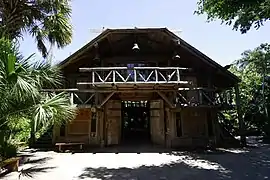McKee Botanical Garden
The McKee Botanical Garden (area of 18 acres (7.3 hectares)) is a non-profit, subtropical botanical garden in Vero Beach, Florida.[1][2] It is located at 350 U.S. Highway 1, Vero Beach, Florida.
McKee Jungle Gardens | |
 The Hall of Giants, McKee Botanical Garden | |
| Location | 350 U.S. Highway 1 Vero Beach, Florida |
|---|---|
| Nearest city | Vero Beach, Florida |
| Coordinates | 27.6076°N 80.3820°W |
| Area | 18 acres (7.3 hectares) |
| Architect | William Lyman Phillips |
| NRHP reference No. | 97001636[1] |
| Added to NRHP | January 7, 1998 |
History
It was founded in 1929, when Waldo E. Sexton and Arthur G. McKee purchased an 80-acre (32 ha) tropical hammock along the Indian River.[3][4][5] Tropical landscape architect William Lyman Phillips was hired to design its streams, ponds, and trails. Its indigenous vegetation was augmented with ornamental plants and seeds from around the world. In 1932, they proceeded to open the garden, then known as McKee Jungle Gardens, as a tourist attraction. Although the Garden was successful for several decades, it shut down in 1976, and most of its land was sold for development. The site remained vacant for twenty years until the Indian River Land Trust purchased it in 1995. The current Garden was formally dedicated in 2001.[6] It is now a Florida landmark and on January 7, 1998, it was added to the U.S. National Register of Historic Places under its former name of McKee Jungle Gardens.[1] Currently, there are several buildings on the garden including the office, gift shop, education center and a restaurant.
Flora
The Garden's collections currently include:
- Adenium obesum
- Aechmea 'Blue Tango'
- Aechmea leuddemanniana 'Mend'
- Aechmea pineliana var. minuta
- Aechmea 'Li'l Harvey'
- Aleurites moluccana
- Alpina purpurata 'Eileen McDonald'
- Alpinia calcarata
- Alpinia zerumbet
- Ananas comosus
- Annona glabra
- Annona muricata
- Anthurium 'White Gemini'
- Ardisia crenata
- Ardisia escallononioides
- Aristolochia gigantea
- Aristolochia grandiflora
- Asclepias species
- Bambusa chungii
- Barleria micans
- Bauhinia punctata
- Bauhinia species
- Begonia 'Beefsteak'
- Belamcanda chinensis
- Billbergia species
- Bixa orellana
- Bromelia pinguin
- Brugmansia species
- Brunfelsia jamaicensis
- Caladium 'Aaron'
- Caladium 'Florida Starburst'
- Caladium 'Florida Sweet Heart'
- Caladium 'Freda Hemple'
- Caladium 'Ginger Land'
- Caladium 'June Bride'
- Caladium 'White Queen'
- Caldium 'Scarlet Pimpernel'
- Calliandra haematocephala
- Callicarpa americana
- Callicarpa americana alba
- Canna species
- Carica papaya
- Chamaedorea tepejilote
- Citharexylum spinosum
- Clerodendron fairchildianum 'Musical Note'
- Clerodendron speciosissimum
- Clerodendrum bungii
- Clerodendrum quadriloculare
- Clerodendrum thomsoniae
- Clerodendrum ugandense
- Clivia species
- Congea tomentosa
- Cordia lutea
- Cordia boissieri
- Costus barbatus
- Crinum americanum
- Crinum asiaticum
- Crinum species (dwarf)
- Curculigo capitulate
- Curcuma species
- Delonix regia
- Dendrobium × hybrid
- Dichromena species
- Dombeya wallichii
- Dracaena fragrans
- Epidendrum 'Kauai Sunrise'
- Eucalyptus deglupta
- Ficus benghalensis
- Ficus natalensis leprieurii
- Gigantochloa pseudoarundidacea
- Glandularia tampensis
- Grewia caffra
- Habranthus brachyandrus
- Hamelia cuprea
- Hamelia macrantha
- Hamelia patens
- Hedychium gardnerianum
- Heliconia rostrata
- Hibiscus coccineus
- Hibiscus rosa-sinensis
- Hoya carnosa
- Ipomoea carnea
- Jacquemontia penthantha
- Jatropha podagrica
- Justicia species
- Kaempferi pulchara
- Laelia pacavia
- Lagerstroemia speciosa
- Lantana trifolia
- Lonicera sempervirens
- Megaskepas erythrochlamys
- Mussaenda 'Dona Aurora'
- Myrsine guianensis
- Nelumbo 'Mrs. Perry Slocum'
- Nelumbo species
- Nymphaea species
- Odentatum stricta
- Oxalis 'Montana'
- Passiflora citrine
- Passiflora hahnii
- Passiflora species
- Passiflora × violacea
- Pentas lanceolata
- Petrea volubilis
- Phoenix hybrid
- Plumbago scandens
- Plumeria species
- Podranea ricasoliana
- Pseuderanthemum alatum
- Pseudobombax ellipticum
- Rondeletia leucophylla
- Ruellia brittoniana
- Russelia equisetiformis
- Russelia sarmentosa
- Sagittaria lancifolia
- Stachytarpheta urticifolia
- Vachellia farnesiana
- Victoria cruziana.
References
- "National Register Information System". National Register of Historic Places. National Park Service. March 15, 2006.
- McKee Botanical Garden listing at FL heritage website
- Great Floridians of Vero Beach
- Hutchinson, Hubbard (Sep 11, 1932). "Florida's Jungle Garden of Rare Plants: In the McKee Park the Riotous Blooms of Tropical Lands Have Been Added to the Native Growths With Unique Effect". New York Times. p. SM17.
- Clarke, Jay (December 12, 1971). "They Call It 'The Damndest Place You Ever Saw'—On the Beach Where Turtles Come to Cry". New York Times. p. XX3.
- Raver, Anne (10 February 2002). "A 1930's Roadside Attraction Blooms Again". The New York Times. Retrieved 9 April 2022.